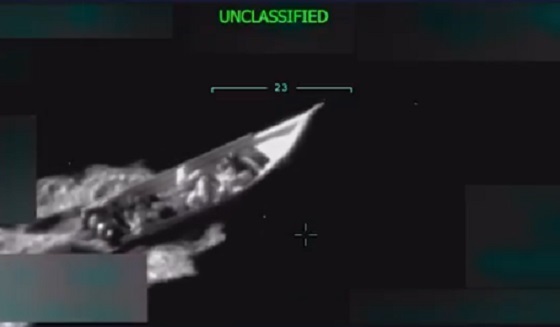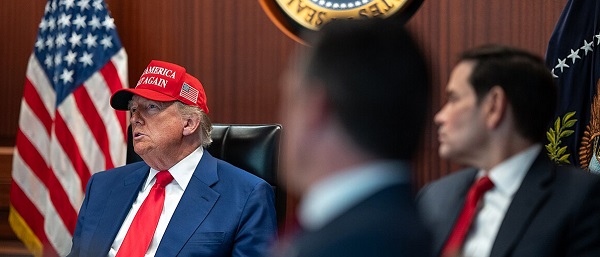Crime
U.S. Missile Strike on Alleged Narco-Boat Tied to Maduro and Ohio Indictment of Chinese Firms Signal Dramatic Escalation in War on Fentanyl

From Maduro’s Venezuela to Chinese precursor companies, the administration widens its whole-of-government crackdown on synthetic drugs.
The United States has dramatically escalated its war on fentanyl traffickers this week, with a missile strike on a suspected Venezuelan narco-vessel and a sweeping indictment naming numerous Chinese nationals, chemical precursor companies, and dealers in Ohio.
The Justice Department on Wednesday unveiled an Ohio grand jury indictment charging four China-based chemical companies, 22 Chinese nationals, and three U.S. defendants in a scheme that allegedly pumped potent cutting agents—including Schedule I nitazenes—into southern Ohio’s fentanyl market. The action landed as the administration pressed forward with its “whole-of-government” offensive on synthetic-drug supply lines and newly terror-designated cartels, including a high-profile military strike just hours earlier on a vessel Washington linked to Venezuela’s Tren de Aragua gang.
In an interview before this week’s U.S. government strikes on fentanyl networks, Derek Maltz, the recently retired DEA chief, told The Bureau that chemicals like nitazenes are amplifying the existing threat from Chinese-supplied fentanyl, which he and many U.S. experts view as an intentional, war-like attack from Chinese state-linked networks aligned with Latin cartels.
“We’re getting crushed with carfentanil, xylazine, etizolam, isotonitazene—all those different new psychoactive substances which are coming out of China. So it’s just another phase of the attack,” Maltz said. “I believe that the Chinese criminal networks, Chinese Communist Party, have developed an innovative strategy, long-term strategy, to destabilize and destroy American families and communities using synthetic drugs, operating under the radar from this ongoing drug addiction crisis in America.”
Maltz also pointed to Canada’s failure to cooperate with the DEA on investigations into a massive superlab in British Columbia, which some U.S. sources said contributed to President Trump’s decision earlier this year to levy a 35 percent tariff on Canadian goods. In announcing that tariff, a White House statement warned: “Mexican cartels are increasingly operating fentanyl- and nitazene-synthesis labs in Canada.”
On Tuesday, the administration took its most kinetic step yet: a precision strike from international waters in the Caribbean that destroyed a suspected narco-vessel from Venezuela, killing 11 alleged members of the Tren de Aragua. Washington has accused the gang of operating under President Nicolás Maduro, who U.S. officials say is intentionally trafficking cocaine laced with fentanyl into the United States in concert with the Sinaloa cartel.
President Donald Trump announced the strike from the White House—remarkably, in near real time—saying, “We just, over the last few minutes, literally shot out a boat, a drug-carrying boat, a lot of drugs in that boat.”
Footage released by the Pentagon showed an explosive strike eerily reminiscent of drone attacks on terrorist vehicles in the Middle East—only this time, the target was described as a narco-terror vessel tied to the Maduro regime. Defense Secretary Pete Hegseth said more such operations could follow, adding on Fox: “We knew exactly who was in that boat, we knew exactly what they were doing, and we knew exactly who they represented, and that was Tren de Aragua … trying to poison our country with illicit drugs.”
Caracas has disputed the strike, and analysts are already debating its legal basis under U.S. and international law.
Before the strike, Trump’s border czar Tom Homan told Fox that if cartels threatened U.S. forces, the administration would “take [them] on,” explicitly suggesting military force outside the United States.
On Wednesday, Attorney General Pam Bondi framed the Ohio prosecution as part of a broader push to “dismantle the international pipelines that bring deadly drugs and precursor to our shores,” vowing “swift, complete justice” for actors in China shipping “poison to our citizens.” FBI Director Kash Patel called it a “first-of-its-kind international operation,” saying agents had already seized enough fentanyl powder “to kill 70 million Americans” and pills sufficient “to kill another 270,000.”
Attacking new chemical precursors and lethal narcotics
A superseding indictment in the Southern District of Ohio alleges that, since at least 2022, Tipp City resident Eric Michael Payne bought kilogram shipments of cutting agents from China-based vendors purporting to be pharmacies or chemical companies, then mixed and resold those agents—at times directly with fentanyl—for street distribution in southern Ohio. Two alleged U.S. co-conspirators are named: AuriYon Tresean Rayford, 24, of Tipp City, and Ciandrea Bryne Davis, 39, of Atlanta.
Prosecutors say the Chinese companies openly marketed “protonitazene” and “metonitazene”—Schedule I nitazenes with estimated potencies roughly 100 and 200 times morphine—and pushed veterinary agents such as medetomidine and xylazine as “cut.” Payments flowed via cryptocurrency to wallets controlled by overseas brokers, then through layered accounts to foreign banks. The filing also details sales of tablet presses and other equipment to facilitate fentanyl cutting and pill-making.
Charged companies are Guangzhou Tengyue Chemical Co., Ltd.; Guangzhou Wanjiang Biotechnology Co., Ltd.; Hebei Hongjun New Material Technology Co., Ltd.; and Hebei Feilaimi Technology Co., Ltd. Named individual brokers include Xiaojun Huang and Zhanpeng Huang, who Treasury simultaneously sanctioned under counternarcotics authorities.
Counts include conspiracy to distribute and possess with intent to distribute 400 grams or more of fentanyl mixture, possession with intent to distribute, maintaining a drug-involved premises, evidence tampering, and international money-laundering conspiracy. Payne and Rayford made initial appearances Wednesday and pleaded not guilty.
Minutes after DOJ’s announcement, the Treasury Department rolled out sanctions on Guangzhou Tengyue and representatives Xiaojun Huang and Zhanpeng Huang, underscoring a synchronized law-enforcement and financial-pressure playbook against China-based suppliers feeding U.S. overdose deaths.
That campaign has widened in 2025: In February, the State Department —implementing Executive Order 14157 — designated eight “international cartels and transnational criminal organizations,” including CJNG, Sinaloa, and Venezuela’s Tren de Aragua, as Foreign Terrorist Organizations and Specially Designated Global Terrorists. The move unlocked material-support charges and expanded sanctions. In May, DOJ brought the first material-support-to-terrorism case tied to CJNG, alleging grenade supply and smuggling.
Dayton sits at the junction of Interstates 70 and 75—a central distribution hub for the Midwest—suggesting the new indictment is aimed at severing Chinese cutting-agent pipelines that turn kilogram-scale fentanyl into mass-market pills bound for American communities.
Crime
Public Execution of Anti-Cartel Mayor in Michoacán Prompts U.S. Offer to Intervene Against Cartels

“I don’t want to be just another mayor on the list of those executed”
On the first night of November, during Day of the Dead celebrations, the independent, anti-cartel mayor of Uruapan in Michoacán, Carlos Manzo, was assassinated in the heart of his city during a public festival. His bloody murder has underscored the deadly risks faced by local officials who may lack adequate protection from a state that critics say is corroded by corruption and penetrated by powerful cartel networks that, in some regions, have supplanted government authority. The killing intensifies urgent questions about political and police corruption, cartel impunity, and the scope of U.S.–Mexico security cooperation — with a response from the U.S. State Department today offering to “deepen security cooperation with Mexico.”
Manzo, a fiercely outspoken anti-cartel mayor who took office in 2024 as Uruapan’s first independent leader, was gunned down as he stood before crowds at the annual Day of the Dead candlelight celebration. Witnesses said gunfire erupted shortly after Manzo appeared onstage, holding his young son moments before the attack. The festival, known locally as the Festival de las Velas, drew hundreds of families to Uruapan’s central plaza — now transformed into the scene of Mexico’s latest high-profile political assassination, and a catalyst for nationwide outrage, as online protests surged and citizens called for demonstrations against cartel violence.
According to early reports, at least two suspects have been detained and one attacker was killed on site. Authorities asserted — despite the success of the attack — that Manzo had been under National Guard protection since December 2024, with additional reinforcements added in May 2025 following credible threats to his life.
In Washington today, the killing drew political reaction. “My thoughts are with the family and friends of Carlos Manzo, mayor of Uruapan, Michoacán, Mexico, who was assassinated at a public Day of the Dead celebration last night. The United States stands ready to deepen security cooperation with Mexico to wipe out organized crime on both sides of the border,” Deputy Secretary of State Christopher Landau, the former U.S. ambassador to Mexico, said in a statement shared online.
Federal Security Minister Omar García Harfuch said the gunmen “took advantage of the vulnerability of a public event” to carry out the attack, despite a standing security perimeter.
President Claudia Sheinbaum condemned the killing as a “vile” assault on democracy and vowed there would be “zero impunity.” Her administration convened an emergency security meeting and pledged that the investigation would reach the “intellectual authors” of the crime. Yet the murder has already ignited outrage across Mexico over the government’s failure to protect local officials in cartel-dominated states such as Michoacán, where extortion, assassinations, and territorial disputes continue to erode basic governance.
Manzo had publicly warned of his fate. “I don’t want to be just another mayor on the list of those executed,” he said earlier this year, as he pressed the federal government for better coordination between municipal and military authorities. For years, Uruapan — an agricultural and trade hub in western Mexico — has been the site of deadly clashes between the Jalisco New Generation Cartel and remnants of the Knights Templar Organization, both vying to control lucrative extortion and drug routes.
The killing of Manzo fits a dark and familiar pattern. In 2025 alone, several mayors in Michoacán, Guerrero, and Tamaulipas have been killed in attacks widely attributed to organized-crime groups. In June, the mayors of Tepalcatepec and Tacámbaro were ambushed and slain while traveling in official convoys. More than 90 local officials have been murdered since 2018 — a rate that analysts say reflects how cartels target municipal governments to ensure political control over territories tied to narcotics, mining, and agriculture. Uruapan, at the heart of Mexico’s avocado belt, is a strategic prize for the cartels that tax every shipment leaving the region.
The mayor’s death also recalls earlier tragedies that scarred the nation. In 2012, Dr. María Santos Gorrostieta Salazar, the former mayor of Tiquicheo, was abducted and murdered after surviving two assassination attempts and defying cartel threats. Her death became emblematic of the dangers faced by reformers who refuse to cooperate with criminal groups. More than a decade later, Manzo’s murder illustrates that little has changed — except the brazenness of the attackers, now willing to strike in front of cameras and families celebrating one of Mexico’s most sacred holidays.
The killing has also reignited long-standing U.S. frustration over Mexico’s inability to stem cartel violence, even as the Trump administration has expanded counter-narcotics operations at the border. Under Trump’s renewed directives, the U.S. has classified several Mexican cartels as foreign terrorist organizations and empowered the Pentagon to develop strike options against high-value targets abroad. A September 2025 joint statement between Washington and Mexico City pledged deeper intelligence sharing and cross-border enforcement initiatives, including efforts to halt arms trafficking southward.
However, Mexico’s government remains deeply wary of any U.S. military involvement on its soil. President Sheinbaum has warned that “Mexico will not stand for an invasion in the name of counter-cartel operations,” rebuffing Republican calls for unilateral action. Her position lays bare a long-standing tension between Mexico’s need for U.S. support and its insistence on sovereignty — a fault line that Manzo’s killing has reignited.
The Bureau is a reader-supported publication.
To receive new posts and support my work, consider becoming a free or paid subscriber.
Crime
Canada Seizes 4,300 Litres of Chinese Drug Precursors Amid Trump’s Tariff Pressure Over Fentanyl Flows

In what appears to be the second-largest Chinese precursor-chemical seizure in British Columbia in the past decade, Canadian border and police officials announced they intercepted more than 4,300 litres of chemicals used to manufacture fentanyl and other synthetic drugs at a notoriously troubled port in Delta, B.C.
The announcement of a seizure that occurred in May 2025 comes amid President Donald Trump’s continuing pressure on Ottawa to crack down on fentanyl trafficking in the province — which U.S. officials say has become a key production and shipment point for Chinese and Mexican traffickers.
The seizure — announced jointly by the Canada Border Services Agency (CBSA) and the RCMP — underscores the scale and persistence of global trafficking networks funnelling illicit materials into Canada’s drug markets.
According to the agencies, border officers examined two marine containers that arrived from China in mid-May, both bound for Calgary, Alberta. Acting on intelligence developed by CBSA’s Pacific Region, officers discovered 3,600 litres of 1,4 Butanediol, a key ingredient for producing GHB, often known as the “date-rape drug”; 500 litres of Propionyl Chloride, a chemical precursor used to synthesize fentanyl; and 200 litres of Gamma Butyrolactone (GBL), another controlled intoxicant.
The chemicals were concealed inside 60 clear jugs and 20 blue drums within the containers. Investigators believe the shipment was intended for use in clandestine drug laboratories. The RCMP confirmed that an investigation into the importation network remains ongoing.
The seizure comes amid growing concern about Canada’s port security, particularly in Metro Vancouver, where experts and local officials say criminal networks are exploiting gaps in federal enforcement.
The Delta seizure follows a series of major CBSA operations targeting precursor chemicals at Pacific ports. In May 2022, CBSA officers in the Metro Vancouver District examined a container from China declared as “toys” and discovered 1,133 kilograms of the fentanyl-precursor chemical Propionyl Chloride, with the potential to produce more than a billion doses of fentanyl.
Public Safety Canada also reported that in the first half of 2021, CBSA seized more than 5,000 kilograms of precursor chemicals, compared with just 512 kilograms in 2020 — reflecting what officials called a “dramatic escalation” in attempts to smuggle fentanyl inputs into the country.
In 2023, the City of Delta released a report highlighting major vulnerabilities at port terminal facilities, warning that there is “literally no downside” for organized criminals to infiltrate port operations. The report noted that British Columbia’s provincial threat assessment rated ports as highly susceptible to corruption and organized-crime infiltration.
At the time, Delta Mayor George Harvie called the lack of a dedicated national port-policing force “a threat to national security.” In comments to the Canadian Press, Harvie said that while Canada’s ports fall under federal jurisdiction, the “total absence of uniformed police at the facilities makes them obvious targets for criminal elements — from Mexican drug cartels to biker gangs.”
“We’re witnessing a relentless flow of illegal drugs, weapons and contraband into Canada through our ports, and that threatens our national security,” Harvie said.
The Port of Vancouver complex, which includes major terminals in Delta, Surrey, and Vancouver, handles roughly three million containers annually, with millions more expected as port expansion plans move forward.
The Delta report reiterated how difficult it has become to police these sprawling operations since the Ports Canada Police were disbanded in 1997. More than a quarter-century later, Harvie said, the consequences of that decision are now “alarmingly clear.”
The CBSA announcement today comes as U.S. President Donald Trump has imposed tariffs on Canadian exports, accusing Ottawa of failing to interdict the flow of fentanyl and precursor chemicals trafficked through British Columbia ports. Washington has repeatedly pressed Canada to strengthen port enforcement and anti-money-laundering controls, citing the West Coast’s role in China- and Mexico-linked trafficking networks.
Simultaneously, in trade negotiations with Beijing, Mr. Trump announced a reduction in tariffs tied to the fentanyl supply chain — raising concern that Washington has eased pressure on China, the primary source of finished fentanyl now responsible for hundreds of thousands of overdose deaths across North America.
Subscribe for free to receive new posts and support my work.
For the full experience, please upgrade your subscription and support a public interest startup.
We break international stories and this requires elite expertise, time and legal costs.
-

 Crime2 days ago
Crime2 days agoPublic Execution of Anti-Cartel Mayor in Michoacán Prompts U.S. Offer to Intervene Against Cartels
-

 Environment2 days ago
Environment2 days agoThe era of Climate Change Alarmism is over
-

 Alberta4 hours ago
Alberta4 hours agoAlberta government’s plan will improve access to MRIs and CT scans
-

 Alberta1 day ago
Alberta1 day agoCanada’s heavy oil finds new fans as global demand rises
-

 Justice2 days ago
Justice2 days agoA Justice System That Hates Punishment Can’t Protect the Innocent
-

 Daily Caller12 hours ago
Daily Caller12 hours agoTrump Reportedly Planning Ground Troops, Drone Strikes On Cartels In Mexico
-

 Daily Caller1 day ago
Daily Caller1 day agoNigeria Would Welcome US Intervention In Massacre Of Christians By Islamic Terror Groups
-

 Automotive1 day ago
Automotive1 day agoCanada’s EV experiment has FAILED












